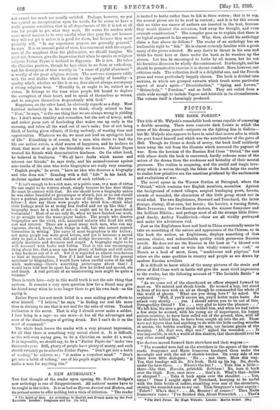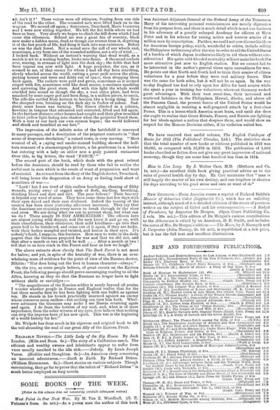FICTION.
THE DARK FOREST.*
THE title of Mr. Walpole's remarkable book seems capable of conveying a double meaning. There were concrete dark forests in which the scene of his drama passed—outposts on the fighting line in Galicia— but Mr. Walpole also appears to have in mind that oscura eden in whiola the poet found himself and which was the antechamber of the gates of- Hell. Though its theme is deeds of mercy, the book itself ruthlessly tears away the veil from the illusions which surround the pageant of war. Even the heroism of the Russian Red Cross " Otriad," the unit with whose deeds the book is concerned, hardly redeems some of the actors of the drama from the crudeness and brutality of their mental processes. The realism is unsparing, and the sordid and tragic love- story which is woven through the fabric of the book helps the reader to realize how primitive are the emotions produced by the excitements and exaltations of war.
The novel opens in the Warsaw Station at Petrograd, where the " Otriad," which contains two English members, assembles. Against the background of ruined villages, surgical bandaging posts, forests. crowds of wounded, the characters of this little group stand out is relief. The two Englishmen, Durward and Trenchard, the latter strange, clumsy, ill-at-ease, but heroic ; the heroine, a nursing Sister. Marie Ivanovna; the two Russian doctors, the sinister Semyonov and the brilliant Nikitin ; and perhaps most of all the strange little Petro- grad dandy, Andrey Vasailievitch—these are all vividly portrayed and make the adventures reaL
Just as the Englishman born and bred in China occasionally seems to take on something of the nature and appearance of the Chinese, so in this book the author, an • Englishman, displays something of that curious, elusive, and indescribable quality which permeates Russian novels. He does not see the Russian in the least as "a blessed sort of idiot unable to read or write but vitally conscious o God," or *Russia as a land of snow, ikons, " mushrooms and pilgrims," but seizes on the same qualities in country and people as are drawn by modern Russian novelists.
It is difficult to know which of the many pictures of the strain and stress of Red Cross work in battle will give the most vivid impression 'to the reader, but the following account of " The Invisible Battle " is very striking :— " As we came out of the churchyard an officer stepped forward to meet us. We saluted and shook hands. He seemed a boy, but stood in front of his men with an air as though ho commanded the whole of this world of ghosts. What are you doing here t' he asked. We 'explained ' Well, if you'll excuse me, you'd better make haste. An ;attack very shortly . . . yes. I should advise you to be out of this. Petrogradaky Otriad ? Yes . . . very glad to have the pleasure . . We left him, hie men a grey cloud behind him, and when we had taken a few steps he seemed, with his young air of importance, his happy serious courtesy, to have been called out of the ground, then, with all- his shadows behind him, to have been caught up into the air. These were not figures that had anything to do with the little curling wreaths of smoke, the bottles cracking in the sun, our furious giants of the morning. Boje moi, Boje moi /' sighed the wounded. . . . It, was impossible, in such a world of dim shadow, that there should ever be any other sound again."
The doctors moved forward their stretchers and their wagons :- " The wounded were laid on the stretchers in the square of the cross- roads. Semyonov and Marie Ivanovna bandaged them under the moonlight and with the aid of electric-torches. On every side of me there were little dialogues : No . . not there. More this way. Yes, that bandage will do. It's fresh. Hold up his leg. No, durak, under the knee there. . . Where's the lint ? . . . Turn him a little- there—like that. Horosho, golubchik. Scitchass I No, turn it back over the thigh. Now, once more . . . that's it. What's that—bullet or shrapnel ? . . . Take it back again over the shoulder. . . . Yes, twice I' Once I caught sight of Trenchard, hurrying to be useful with the little bottle of iodine, stumbling over one of the stretchers. causing the wounded man to cry out. Then Semyonov's voice angrily : Tchorg I Who's that ? . . . Ah, Meestor 1 of course I ' Then Marie .Ivanovna's voice : I've finished this, Alexei Potrovitch. . . . That's
• Tim Dark Forest. By Hugh Walpole. London: Martin Seeker. [131.1 all, isn't it t' These voices were all whispers, floating from one side a the road to the other. The wounded men were lifted back on to the wagons. We moved off again • Semyonov, Trenchard, Marie Ivanovna and I were now sitting together. We left the flat fields where we had been so busy. Very slowly we began to climb the hill down which I had come this afternoon. Behind me was a great fan of country, black now under a hidden moon, dead as though our retreat from it, depriving it of the last proofs of life, had flung it back into non-existence. Before us was the dark forest. Not a sound save the roll of our wheels and, sometimes, a cry from one of the wounded soldiers, not a stir of wind.... I looked back. Without an instant's warning that dead world, as a match is set to a waiting bonfire, broke into flame. A thousand rockets rose,- soaring, in streams of light into the dark sky ; the fields that had been vapour ran now with light. A huge projector, the eye, as it seemed to me, of that enemy for whom I had all day been searching, slowly wheeled across the world, cutting a great path across the plain, picking houses and trees and fields out of apace, then dropping them back again. The rockets were gold and green, sometimes as it seemed ringed with fire, sometimes cold like dead moons, sometimes sparkling and quivering like great stars. And with this light the whole world crackled into sound as though the sky, a vast china plate, had been smashed by some angry god and been flung, in a million pieces, to earth, The rifle-fire rattled from horizon to horizon like a living thing. Now the shrapnel rose, breaking on the dark sky in flashes of colour. Sud- denly some house was burning. The flames climbed in a column, hovering in tongues that advanced and retreated, lifted and fell again. In the farthest distance other houses had caught and their glow trembled in faint yellow light fading into shadow when the projector found them. With a roar at our back our own cannon began ; the world bellowed and shook and trembled at our feet."
The impression of- the infinite noise of the battlefield is conveyed in many passages, and a description of the poignant contrasts in "that scene of desperate desolation," a ruined town, is very moving. " Most ironical of all, a gaping and smoke-stained building showed the half- torn remnant of a cinematograph picture, a fat gentleman in a bowler hat entering with -a lady on either arm a gaily painted restaurant Over this, in big letters, the 'sward ' FARCE.' "
The second part of the book, which deals with the great retreat before the Austrians, should bo read by those who fail to realize the awful cost in men which is the result of want of preparation and want Of material An extract from the diary of the English doctor, Trenchard, will bring home the desperation of an Army at finding itself short of munitions of war :- "Lord! but I am tired of this endless bandaging, cleaning of filthy wounds, paring away of ragged ends of flesh, smelling, breathing, drinking blood and dust and dirt. The poor fellows ! Their bravery is beyond any word of -mine. They have come these last few days with their eyes dazed and their ears deafened. Indeed the roaring of the cannon has been since yesterday afternoon incessant. They say that the Austrians are straining every nerve to break through to the river and cross. We are doing what we can to prevent them, but what can we do ? There simply IS NOT AMMUNITION ! The officers hero are almost crying with despair, and the men know it and go on, with their cheerfulness, their obedience, their mild kindliness—go into that green hell to be butchered, and come out of it again, if they are lucky, with their bodies mangled and twisted, and horror in their eyes. It's nobody's fault, I suppose, this business. How easy to write in the daily papers that the Germans prepared for war and that we did not, and that after a month or two all will be well. . . . After a month or two ! tell that to us here stuck in this Forest and hear us how we laugh."
The above extracts show clearly that The Dark Forest is not meat for babes; and yet, in spite of the brutality of war, .there is an over- whelming mass of evidence for the point of view of the Russian doctor, Nikitin: "War does bring out the best in human character—always."
-On the eve, as some people believe, of great events on the Eastern Front, the following passage should prove encouraging reading to all the Allies, knowing as they do that the Russians no longer have to fight
without shells or cartridges :— ' • " The magnificence of the Russian soldier is surely beyond all praise. I wonder whether people in Franco and England realize that for the last three months here he has been fighting with one bullet as against ten. He stands in his trench practically unarmed against an enemy whose resources seem endless—but nothing can turn him back. What- ever advances the Germans may make I see Russia returning again and again. I do from the bottom of my soul, and, what is of more importance, from the sober witness of my eyes, here believe that nothing can stop the impetus-born of her new spirit. This war is the beginning Of a world history for her."
Mr. Walpole has done much in his vigorous and original book to lift the veil shrouding the soul of our_ great Ally of the Eastern Front.



























 Previous page
Previous page